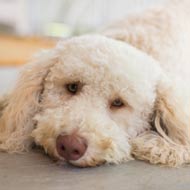Kennel Club may officially recognise crossbreeds

"The Kennel Club’s concern is that too many crossbreed breeders are making false promises".
For the first time, the Kennel Club may officially recognise crossbreed dogs such as Labradoodles and puggles, in the same way as pedigrees.
These breeds have long been registered on the club's companion dog and activity registers, but this does not include health test results or detailed information about ancestry.
Demand for crossbreeds, or 'designer dogs', has risen dramatically in recent years and is thought to be fuelled by celebrity fashions. Examples include Rita Ora and Rihanna, who both own maltipoos (Maltese-poodle crosses).
Kennel Club secretary Caroline Kisko said: "The Kennel Club’s concern is that too many crossbreed breeders are making false promises about how their dog will turn out.
"By their nature, crossbreed puppies will inherit a random combination of genes from their two breeds of parent and so you cannot accurately predict their size, exercise, grooming needs or temperament, which is why two dogs within the same crossbreed category can look and behave entirely differently."
Such false promises could result in owners abandoning their dogs when they realise they don't suit their lifestyles, she added.
Lack of DNA testing for breeding dogs is another problem. Ms Kisko explained: "Many breeders of crossbreeds are failing to give the parents of their puppies the appropriate health and DNA tests for conditions that can affect their breeds, leading the puppies to inherit problems.
"The parents of a crossbreed puppy should both be health tested for the conditions that are most likely to affect their individual breed."
However, the proposal to recognise crossbreeds has reportedly prompted criticism from some.
Jean Lanning, a former breeder and dog show judge, is quoted by the Telegraph as saying: "A register of crossbreeds will only encourage unscrupulous breeders to charge even greater sums than they do already on the basis that what they are selling is a designer dog".
The Kennel Club says it is currently asking for opinions from breeders and the wider public to find out if there is an "appetite" for a crossbreed register.



 The Veterinary Medicines Directorate (VMD) is inviting applications from veterinary students to attend a one-week extramural studies (EMS) placement in July 2026.
The Veterinary Medicines Directorate (VMD) is inviting applications from veterinary students to attend a one-week extramural studies (EMS) placement in July 2026.